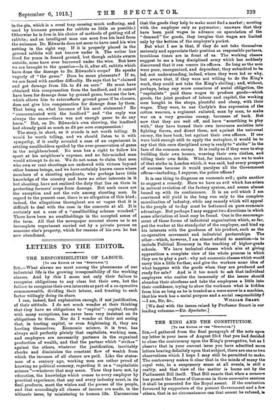LETTERS TO THE EDITOR.
THE RESPONSIBILITIES OF LABOUR.
[To TEE EDITOR or THE "SPECTATOR."]
Sir,—What alarms me most among the phenomena of our industrial life is the growing irresponsibility of the working classes. And by this I mean not only their failure to recognize obligations to any class but their own, but the failure to recognize their own interests as part of a co-operative commonwealth, dividing their labour, and trusting to each factor willingly doing its share.
I can, indeed, find explanation enough, if not justification, of their attitude. I do not much wonder at their thinking that they have no obligations to "capital": capital, though with many exceptions, has never been very insistent on its obligations to them. Nor do I wonder at their not seeing that, in hurting capital, or even frightening it, they are hurting themselves. Economic science, it is true, has always said perfectly plainly that capitalists, working men, and employers are necessarily partners in the organized production of wealth, and that the partner which " strikes " against the others, whatever the justification, inevitably checks and diminishes the constant flow of wealth from which the incomes of all classes are paid. Like the states- men of a century ago, working men are rather proud of knowing no political economy, regarding it as a " capitalistic- science "—whatever that may mean. Thus they have not, by education, the knowledge which comes to every employer by practical experience, that any and every industry must, in its final products, meet the wishes and the purses of the people, and that accordingly all classes of income are made, in the ultimate issue, by ministering to human life. Unconscious that the goods they help to make must find a market ; meeting with the employer only as paymaster ; unaware that they have been paid wages in advance on speculation of the "demand" for goods, they imagine that wages are limited only by the bottom of the employer's pocket.
But what I see is that, if they do not take themselves seriously and appreciate their position as responsible partners, troublous times are in front of us. The working classes suggest to me a long disciplined army which has suddenly discovered that it can coerce its officers. So long as the men were poor, unorganized, and dependent, they submitted to be led, not understanding, indeed, where they were led or why, but aware that, if they were not willing to do the King's work, they could not take the King's shilling ; and, without., perhaps, being any more conscious of social obligation, the "capitalists" paid them wages to produce goods—which goods, the joint product of labour and capital, the working men bought in the shops, plentiful and cheap, with their wages. They were, to use Carlyle's fine expression of the cotton weavers, a regiment enlisted, man by man, to make war on a very genuine enemy, bareness of back. But now that they are well off, and have "something to play with," they have turned their own insurance societies into fighting forces, and direct them, not against the universal enemy, the bare hack, but against their own officers. If one were bold enough still to apply the metaphor, it would be to say that this once disciplined army is ready to " strike " in the face of the common enemy. It is really as if they were to stop building their own houses, weaving their own clothes, and tilling their own fields. What, for instance, are we to make of that strike in London which, it was said, had every prospect of success because it would paralyse all the Government offices—including, I suppose, the police offices P It is one thing to diagnose an economic evil; quite another to suggest a remedy. Here we have an evil which has arisen in natural evolution of the factory system, and seems almost bound up with its continuance. It is an evil which I am convinced will yield in the long run only to the complete moralization of industry, while any remedy which will appeal to the people of to-day must be bottomed on pure economic advantage. But perhaps I may suggest two directions in which some alleviation at least may be found. One is the encourage- ment of those forms of industrial organization which, so far, put the worker at the standpoint of the employer, and bind up his interests with the goodness of his product, such as the co-operative movement and industrial partnerships. The other—which, however, I am almost afraid to mention—is to include Political Economy in the teaching of higher-grade schools. We have technical classes which aim at giving apprentices a complete view of the whole process in which they are to play a part : why not economic classes which would carry this a little further, and give the workers some idea of what happens with the goods when they are produced and ready for sale ? And is it too much to ask that individual employers who realize the immensity of the issues should abandon their aloofness and take the employees a little into their confidence, trying to show the workman what is hidden from him so long as be is treated as a mere screw in a machine, that his work has a social purpose and a social responsibility ?
—I am, Sir, &c., WILLIAM SMART. [We deal with the issues raised by Professor Smart in our leading columns.—En. Spectator.]






































 Previous page
Previous page